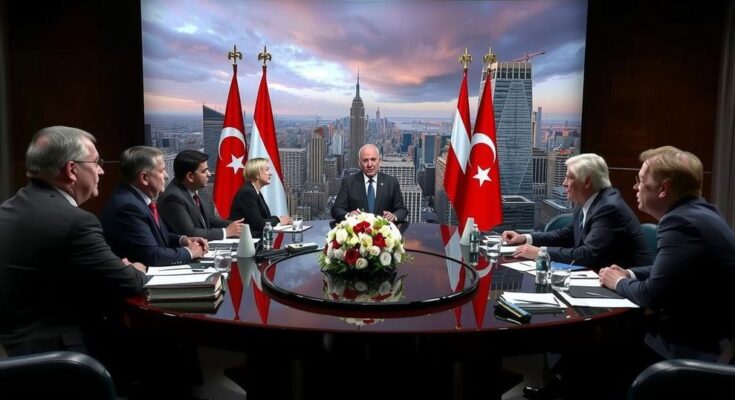An Israeli airstrike in Khan Younis killed at least 28 civilians. Another airstrike targeted media personnel in southern Lebanon, resulting in additional casualties. The US Secretary of State is set to discuss a postwar plan for Gaza amidst ongoing hostilities, while Israel continues its military operations in the region.
An Israeli airstrike early on Friday morning resulted in the deaths of at least 28 Palestinian civilians in Khan Younis, according to reports from Wafa, the Palestinian news agency. The airstrike targeted a residential home in the al-Manara neighborhood, causing multiple injuries amidst ongoing attacks by the Israeli military across the Gaza Strip. Al Jazeera further reported that more than ten residential buildings were destroyed in Jabalia, intensifying a renewed offensive in northern Gaza. The civil defense agency in Gaza labeled these actions a “major massacre.” In another tragic incident, an Israeli airstrike claimed the lives of at least three media staff members in a guesthouse in southern Lebanon, including employees from Al-Mayadeen and Al-Manar. Reports indicate that the specific accommodation was directly targeted. US Secretary of State Antony Blinken is scheduled to meet Lebanese Prime Minister Najib Mikati and foreign ministers from Jordan and the United Arab Emirates in London, as discussions surrounding a postwar plan for Gaza intensify. Blinken expressed hopes that Iran would recognize the risks of further aggression against Israel, particularly in light of Israel’s intention to retaliate for a recent missile barrage attributed to Iran. Meanwhile, Israeli intelligence chief David Barnea is expected to travel to Doha to discuss negotiations related to hostages held by Hamas, amidst ongoing efforts to halt the violence. A senior Hamas official indicated that the group is open to a ceasefire but outlined conditions that include Israeli withdrawal and a prisoner exchange deal. In other developments, at least 17 civilians, predominantly women and children, were killed in a recent bombing of a school in the Nuseirat refugee camp, with further injuries reported. Iran’s armed forces have been placed on alert amid concerns of escalating conflict, as reported by the New York Times. Israel has continued airstrikes in Beirut’s southern suburbs, reportedly destroying buildings and causing significant damage. Additionally, Israeli military operations have led to the deaths of claimed Hamas members, including individuals employed by the UN relief agency in Gaza, although Israel has been criticized for targeting civilians without substantiated evidence. President Emmanuel Macron of France urged restraint in a message to Prime Minister Netanyahu, emphasizing the importance of civility amidst the conflict.
The Middle East crisis has witnessed escalated hostilities, particularly between Israel and Hamas forces in Gaza, coupled with a broader regional tension involving Hezbollah in Lebanon. The recent airstrikes conducted by Israel have led to significant loss of civilian life, raising concerns of war crimes and humanitarian crises. As international responses unfold, the role of key players such as the US and Iran become critical in shaping the conflict’s trajectory. Blinken’s meetings with Middle Eastern leaders highlight diplomatic efforts aimed at de-escalation and addressing humanitarian needs in Gaza and Lebanon.
The continuing airstrikes by Israeli forces in Gaza, leading to the deaths of civilians and media personnel, underscore the dire humanitarian situation amidst the ongoing conflict. Diplomatic efforts led by the United States aim to mediate between conflicting parties, although prospects for a ceasefire remain uncertain as conditions and demands are articulated by Hamas and regional actors. The international community faces increasing pressure to respond to the escalating violence and humanitarian crisis in the region.
Original Source: www.theguardian.com




